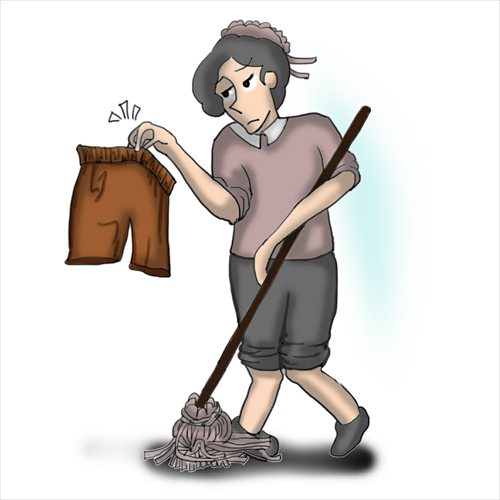Young ayi refuse to wash their bosses’ underwear

Illustration: Lu Ting/GT
One of the most perplexing phenomena that foreign tourists tend to encounter when walking around Shanghai's residential compounds are seeing people's freshly laundered underwear, panties and bras hung outside of apartment doorways and windows or even strung up on electrical lines and trees. For Chinese who were born and raised in small alleyway communities like the lilong of Shanghai and the hutong of Beijing, privacy and personal space are not a concern. For them, letting the world see your undergarments is not the least embarrassing.
But in recent years, as more Chinese switch to apartments and the old communal mentality disappears, attitudes among the younger generations about their unmentionables are shifting. Last week, a 30-year-old ayi surnamed Shen complained on her social media that she was being forced by her male employer to wash his underwear. As she'd only been an ayi for this employer for one month, she found such tasks to be very embarrassing. She finally raised the issue but was told that doing laundry is part of her daily chores. When Shen proposed terminating her contract over this dispute, her employer said her salary would be deducted for breaking her contract.
In 2014, China's Ministry of Commerce issued a domestic service model contract, which stipulates that domestic helpers are in fact NOT responsible for washing underwear. However, here in Shanghai, most local domestic service companies have adopted the model contract issued by the Shanghai Administration for Industry & Commerce and the Association of Shanghai Family Service Trade, which does not specify whether or not domestic helpers must clean their client's underwear. This is the contract that Shen signed, and thus was obligated to either do the laundry or give her employer 30 days notice of her resignation - during which she would still be contractually responsible for cleaning his undies.
Due to the skyrocketing salaries that domestic helpers in Shanghai are earning now, in recent years a growing number of young people have been coming to the city to work in this trade. However, unlike the middle-aged women who traditionally used to work as ayi, this new generation of ayi are much more self-assured, self-conscious and stubborn about what they will and will not do, e.g. refusing to scrub toilets or clean skivvies.
An example of this mentality made the news when a woman in Shanxi Province hired two ayi in their early 20s. One refused to clean the toilet. The other just wanted to go out shopping with her friends rather than stay around the apartment doing her chores. She would get up at 6 am on weekends, cook all three of the day's meals at once, then go out until 8 pm. Her employer found this inappropriate, but rather than settle the matter the young ayi just quit.
With more post-80s and post-90s blue-collar workers joining in China's urban labor market, it is inevitable that there will also be a rising number of generational conflicts in the service sector. According to the latest survey conducted by Chinese blue-collar worker recruitment website baixing.com, post-90s workers tend to switch jobs most frequently because they were raised without any financial hardships or social strife. Due to their entitled and spoiled mind-sets, they refuse to stick with jobs that they find unsatisfying or humiliating.
Thus, it's up to those businesses that are hiring younger workers to adapt to their personalities and attempt to figure out sustainable solutions, such as mediation, to better handle disputes between them and customers.
For me personally, I would never want or let a stranger wash my panties, nor would I allow some other women to clean my husband's briefs. However, I feel that both parties in Shen's case raised valid points. But Shen, immature and compulsive, went about it the wrong way. Rather than complain to her employer, she ought to have gone to the domestic service company who introduced her to the family and request a resolution.
As for the ayi industry itself, it's probably also high time for middle-class and wealthy customers who hire domestic helpers to recognize that young workers will no longer stand for being treated as indentured servants as older ayi once did.
The opinions expressed in this article are the author's own and do not necessarily reflect the views of the Global Times.